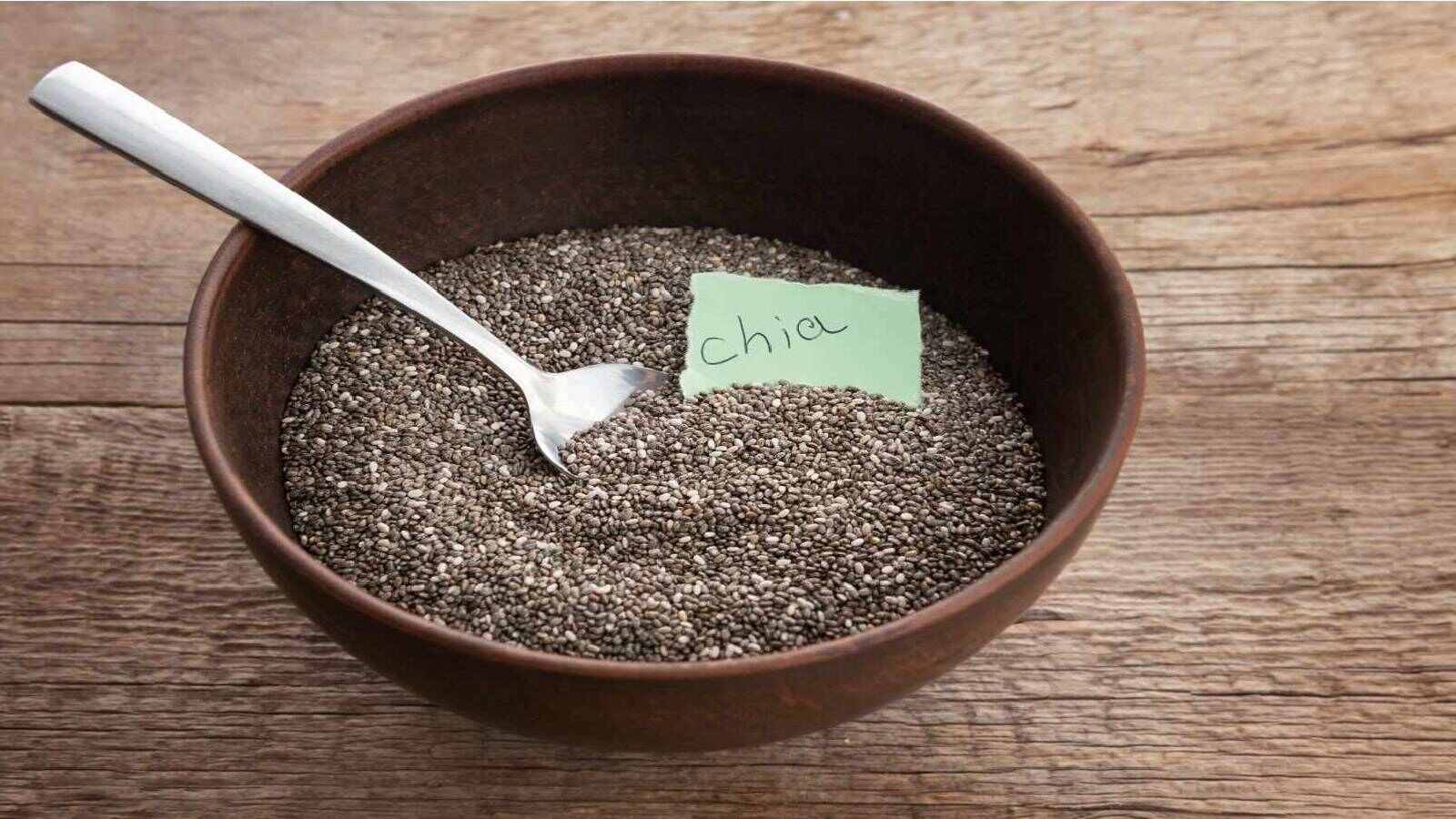Eating chia seeds with milk seems to have become quite a popular option, especially when it comes to replacing breakfast cereals and other high-sugar snacks. Be it smoothies or yoghurt bowls and puddings, chia seeds and milk is a much-loved combo! This tiny powerhouse is regarded as one of the most nutritious superfoods out there and is a staple in many healthy diets around the world. It has become extremely popular due to its rich fibre, omega-3 fatty acid, and antioxidant content. Know how to include chia seeds with milk with five delicious recipes you must try!
What are chia seeds?
Chia seeds are tiny nutritious powerhouses derived from the Salvia hispanica plant, which is native to Central and South America. The benefits of chia seeds are numerous. These edible seeds are rich in essential nutrients, making them a popular nutritional addition. They are high in dietary fibre, which helps with digestion and satiety, as found in a study published in the Food Science and Nutrition. Chia seeds also contain omega-3 fatty acids, which are essential for cardiovascular health and brain function. Also, they include a high protein content, which promotes muscle growth. Plus, chia seeds contain antioxidants, which help protect cells from free radical damage and reduce the risk of chronic diseases.
Also Read: Tiny superheroes: 12 surprising benefits of chia seeds you ought to know
Is it safe to consume chia seeds with milk?
Yes, it is safe to consume these seeds with milk. “In fact, chia seeds combined with milk can create a delicious and nutritious snack or meal option,” says nutritionist Rakshita Mehra. Here is how these help:
- Enhances nutrient absorption: The calcium and vitamin D in milk can help your body absorb the iron and magnesium from chia seeds more effectively.
- Increases protein intake: Combining chia seeds and milk provides a complete protein source, which is essential for building and repairing tissues.
- Adds calcium and vitamin D: Milk is a rich source of calcium and vitamin D, both of which are crucial for bone health.
While consuming these seeds with milk is generally safe and beneficial, it is important to be aware of your individual dietary needs and any allergies or intolerances. If you have dairy allergies or sensitivities, you can opt for plant-based milk alternatives like almond milk or oat milk. Also, it is best to check with your doctor or nutritionist to know what will suit you the best.
How to eat chia seeds with milk?
Here are some delicious ways to add chia seeds with milk, as suggested by the expert:
1. Chia pudding
Ingredients:


- 1/4 cup of chia seeds
- 1 cup of milk (your choice: almond, oat, cow’s, etc.)
- 2 tablespoons of maple syrup (or honey)
- 1 teaspoon of vanilla extract
- Pinch of salt
- Toppings: fresh fruit, nuts, seeds, chocolate chips
Method:
- In a bowl, whisk together all the ingredients.
- Cover the bowl and refrigerate for at least 2-4 hours, or overnight for a firmer pudding. The seeds will absorb the liquid and form a thick gel.
- Divide the pudding into bowls and top with your favourite toppings. Enjoy!
2. Chia seeds smoothie
Ingredients:
Take a Poll
Take a Poll
- 1 tablespoon of chia seeds
- 1 cup of milk (almonds, oats or cow)
- 1 banana, frozen
- 1/2 cup of frozen berries (strawberries, blueberries, raspberries)
- 1 tablespoon of honey or maple syrup
- 1 tablespoon of protein powder (optional)
Method:
- Combine all the ingredients in a blender.
- Blend until smooth and creamy.
- Pour into glasses and enjoy immediately.

3. Chia seeds milkshake
Ingredients:
- 1/4 cup of chia seeds
- 1 cup of milk (your choice: almond, oat, cow’s, etc.)
- 1 banana, frozen
- 1/2 cup of frozen berries (strawberries, blueberries, raspberries)
- 1 tablespoon of honey or maple syrup
- 1 tablespoon of protein powder (optional)
- Ice cubes (optional)
Instructions:
- In a small bowl, combine chia seeds with milk and let it sit for 15-30 minutes, or overnight for a thicker texture.
- Add the remaining ingredients (banana, berries, honey, protein powder, and ice cubes) to a blender.
- Blend until all ingredients are well combined and the mixture has a smooth texture.
- Pour the milkshake into glasses and enjoy immediately.
4. Chia seeds infused milk
Ingredients:
- 1 cup of milk (your choice: almond, oat, cow’s, etc.)
- 1 tablespoon of chia seeds
- Sweetener (optional): honey, maple syrup, or agave nectar
- Flavourings (optional): vanilla extract, cinnamon, or cocoa powder
Method:
- In a glass or jar, whisk together the milk, chia seeds, and any desired sweeteners or flavourings.
- Cover the container and let it sit in the refrigerator for at least 30 minutes, or overnight for a thicker texture. The chia seeds will absorb the liquid and form a gel-like consistency.
- Stir the mixture well before drinking.
5. Chia seeds cereal
Ingredients:
- 1 cup of rolled oats
- 1/4 cup of chia seeds
- Milk of your choice
- 1/4 cup of nuts or seeds (almonds, walnuts, flaxseed, etc.)
- 1/4 cup of dried fruit (raisins, cranberries, apricots, etc.)
- Sweetener (optional): honey, maple syrup, or agave nectar
- Flavourings (optional): cinnamon, vanilla extract, or a pinch of salt
Method:
- In a bowl, combine the oats, chia seeds, nuts or seeds, dried fruit, sweetener (if using), and flavourings (if using).
- Pour in enough milk or plant-based milk to cover the ingredients.
- Cover the bowl and let it sit in the refrigerator for at least 30 minutes, or overnight for a thicker texture. The chia seeds will absorb the liquid and create a gel-like consistency.
- Enjoy your chia cereal as is, or top it with additional toppings like fresh fruit, yoghurt, or a drizzle of honey.
Benefits of chia seeds
Here are some potential benefits of chia seeds.
1. Aids in digestion
The seeds are a rich source of dietary fibre, which plays a crucial role in digestion. Fibre helps to bulk up stool, making it easier to pass through the digestive system and preventing constipation. Additionally, fibre can help to promote the growth of beneficial gut bacteria, which are essential for optimal digestion and overall health. By incorporating these seeds into your diet, you can improve your digestive health and reduce the risk of digestive problems, as found in a study published by Harvard Medical Publishing.
2. Supports heart health
The seeds are a valuable addition to a heart-healthy diet due to their high content of omega-3 fatty acid, as found in a study published in the Food and Science Nutrition. These healthy fats help to lower bad cholesterol (LDL) levels and raise good cholesterol (HDL) levels, which can reduce the risk of heart disease. Additionally, the fibre in the seeds can help to lower blood pressure, another important factor in maintaining heart health. By incorporating chia seeds into your diet, you can support your cardiovascular health and reduce your risk of heart-related problems.

3. Helps in losing weight
These seeds can be a helpful tool for weight management due to their high fibre content and ability to absorb water. The fibre in chia seeds helps to promote feelings of fullness, reducing overall calorie intake. Additionally, when these seeds are mixed with water or other fluids, they form a gel-like substance that can help to slow down digestion and prolong feelings of satiety. This can help to reduce cravings and prevent overeating, ultimately aiding in weight loss efforts, as found in a study published in the Journal of Medical and Health Science.
4. Enhances bone health
The seeds are a good source of calcium and magnesium, both of which are essential for maintaining strong bones, as found in a study published in the Journal of American College of Nutrition. Calcium is the primary mineral found in bones, while magnesium plays a supporting role in bone metabolism. By incorporating chia seeds into your diet, you can help to ensure that your body has the necessary nutrients to support bone health and reduce the risk of osteoporosis which is a bone disease characterised by low bone density and decreased bone strength. This makes bones more brittle, increasing the risk of fractures.
What are the side effects of chia seeds with milk?
While these seeds are generally safe and healthy for most people, there are a few potential side effects to consider:
- Digestive issues: As these seeds are high in fibre, consuming them in large amounts may cause bloating, gas, or constipation in some individuals, especially if they are not used to a high-fibre diet.
- Choking hazard: The seeds can expand significantly when exposed to liquid. If they are eaten dry and not adequately hydrated, they could expand in the oesophagus and pose a choking risk. Always consume them with sufficient liquid.
- Blood thinning: These seeds contain omega-3 fatty acids, which can thin the blood. People on blood-thinning medication should consult their doctor before consuming large amounts of chia seeds.
- Allergic reactions: Although rare, some people may experience allergic reactions to these seeds, including symptoms like skin rashes, itching, or difficulty breathing.
- Lowers blood pressure: The seeds can help lower blood pressure, but in people with already low blood pressure or those on medication for hypertension, this effect could be too strong. It’s important to monitor intake if you have blood pressure concerns.
Keep in mind!
Moderation is key, just like with any other food. Balanced serving quantities are recommended, and people with sensitive stomachs can opt for lactose-free or plant-based milk substitutes. Chia seeds soaked in milk can be a delightful and healthful supplement to any diet for overall well-being when consumed mindfully.
Get latest updates on health and wellness along with Healthy Eating, Nutrition, Recipes, Superfoods